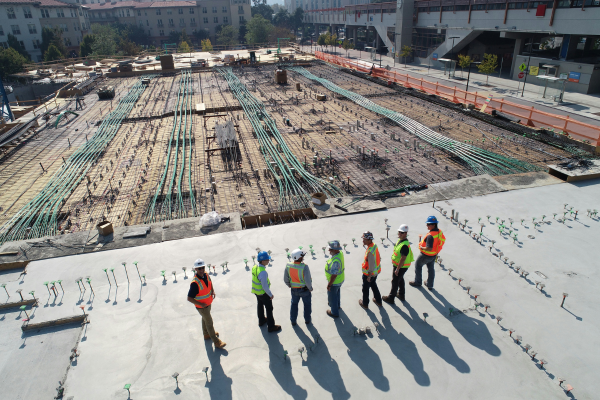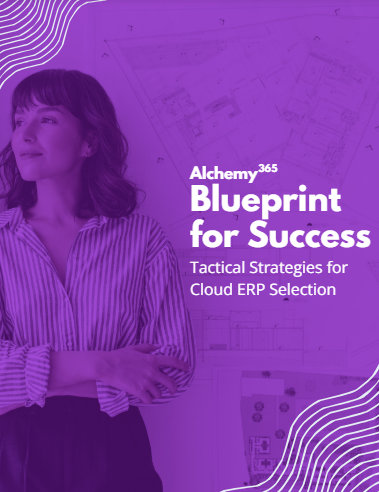What is Construction ERP? Functions and Working
Well, this definition explains what an ERP system does in general. But what does it have to do with your construction? You know better than anyone that construction companies are composed of hundreds, if not thousands, of moving parts, and operating a company like that, like coaching eight coaching teams at once! You have to:
- Manage the workforce
- Take inventory of the equipment
- Keeping track of tools and materials
- Making sense of the piles of invoices
- Estimate and bid on different jobs
With a robust construction ERP (and we’ll explain later what makes it “robust”), you can streamline all these procedures and easily manage your construction company. Enterprise resource planning is a great way to track project details, create a realistic budget, handle accounting/payroll, manage subcontractors efficiently, share project-related documents, comply with zoning-related guidelines, and keep the entire project’s analytics visible before stakeholders.
In the next few sections, we’ll discuss the importance of construction ERP in a typical American business and the key benefits of using this amazing tool. It’ll motivate even the most skeptical of our readers now to go ahead and invest in an ideal enterprise resource planning tool of their choice.
The Importance of Construction Software
Here’s a case study to help you understand why ERP systems are vital for the construction industry. This case study comes from a large construction firm based in the Midwest. The firm was using outdated systems for resource planning and struggled to manage its growing operations. The stakeholders decided that an accessible construction ERP solution could help them improve overall business performance. As a result, they invested in a cloud-based enterprise resource planning software only to witness these benefits:
- The workforce’s productivity increased by 21% in the next seventeen weeks.
- The construction company increased its profitability by an impressive 43% in the first year after going live with the ERP system.
- The centralized document management and communication tools in the ERP fostered improved coordination between the office and job sites.
So, the successful ERP implementation allowed this construction firm to scale its operations efficiently and improve its bottom line through data-driven decision-making.
Key Benefits of Construction ERP Software
So, how does an ERP system benefit your construction business? Data says that the global construction market will grow $8 trillion in the next six years. In the US alone, the CAGR of this dashing industry might be around 6% between 2024 and 2030. So, you should be prepared to reap the benefits of this amazing growth spurt by adopting enterprise resource planning. Here’s what it’ll benefit your company:
- Streamlining your business: You can easily manage difficult projects, take care of the finances, share key documents, and handle inventory by using a single platform. It will do wonders to the construction company’s success and enhance collaboration between construction workers.
- Better project visibility: ERP software solutions provide real-time visibility into project budgets, costs, and profitability, enabling project managers to quickly identify and address issues. This fact makes it a key role for construction managers to juggle different projects simultaneously.
- Improved cash flow management: Having trouble managing the flow of cash in a project? Invest in an ERP system to take care of payables and receivables with utmost efficiency.
- Boosting worker productivity: The US construction industry lost between 30 and 40 billion USD due to productivity issues in a single year. However, construction ERP will eliminate all mundane jobs like data entry, making your field crews more engaged at work. Also, automated workflows and reporting will free up time for valuable work.
- Data-driven decisions: Lastly, ERP systems are ushering in a new era of data-driven decisions or DDMs. Construction project managers are using analytical tools to make better results and avoid unnecessary, easily foreseeable delays in project management – all thanks to ERP.
In the next section, we’ll learn the key features of a typical construction ERP system. It’ll help you realize which factors to look for when shopping for the ideal ERP software for your construction business.
Choosing the Ideal Construction ERP: Tips and Best Practices
A survey shows that 95% of companies have noticed significant benefits after ERP implementation. You may wonder how to ensure the success of your ERP implementation plan. The key here is choosing only the best ERP system. You can determine which construction ERP solution would be perfect for your firm by following these simple tips:
- Deployment options: Do you need a cloud-based system or an on-premise ERP solution? Do not choose a cloud-based option if your organization hasn’t worked on this model already. You must also find an option that best fits your IT infrastructure and budget. There’s absolutely no need to go over the budget when choosing construction ERP. However, cloud-based ERP solutions often have lower upfront costs and easier scalability (just leaving it out there!).
- User experience: Many construction managers invest in tech tools that end up becoming merely nightmare fuel for field workers and office employees. Your favorite ERP must have an intuitive interface and mobile capabilities. That’s how you can drive user adoption across your company.
- Support assessment: Another key factor to keep in mind when choosing an ERP system for your construction business is the quality of your vendor’s support services. A smooth transition and reliable post-go-live assistance are crucial for the long-term success of your ERP system. So, if an ERP vendor doesn’t offer robust customer support, then you shouldn’t invest in that product.
- Scalability and flexibility: An ERP solution should grow with your business and adapt to evolving industry demands. That’s why you should always be on the lookout for ERP solutions with major customization options. This system must also integrate with other tech tools already in use.
- Stakeholder involvement: Have you taken the stakeholders in confidence? We’re talking about cross-functional teams here, such as project managers, IT, finance, HR, procurement, etc. You’ll need their input to build internal buy-in for construction ERP selection.
But wait, there’s another problem! Did you know that 55 to 75 percent of ERP implementation projects don’t meet their objectives? This happens when construction companies don’t choose the right features for the ERP solution. That’s why we’ll discuss some of the key features of a typical ERP solution next. Please read this subsection and make sure your favorite ERP system has these features:
Major Features
- Project management: Your ERP software should perform basic tasks like planning and scheduling tasks. It must also track and manage all construction projects efficiently. Don’t invest in any tool that doesn’t do budgeting. Moreover, this tool has to be good at resource allocation, scheduling, and progress tracking/project.
- Financial management: We’d expect an ERP solution to do job costing like a pro. It must also do integrated accounting, centralizing all your finances efficiently. Only purchase an ERP tool that is capable of cost-value reconciliation (CVR), forecasting, cash flow analysis, payroll management, and subcontractor management.
- Procurement and inventory control: An ERP solution must also perform inventory tracking. It must be capable of optimizing material management for streamlined procurement workflows. You shouldn’t buy a tool incapable of vendor management or purchase order processing.
- Collaborating and communication: Don’t neglect this key feature because construction projects can’t be successful unless office workers, field crews, subcontractors, stakeholders, etc. are into the loop and collaborating in real-time.
- Compliance management: Compliance management is important to reduce on-site accidents as well as avoiding hefty penalties. So, your ERP software must have okay features to monitor and ensure adherence to industry regulations, safety standards, and quality requirements.
- Document sharing and management: Similarly, your ERP solution must have a centralized, fully secure repository for efficiently storing, sharing, and collaborating on construction documents, drawings, and other files, with version control.
- Analytics and reporting: finally, another must-have of construction enterprise resource planning system is analytics. Data reporting features, along with business intelligence capabilities, are the best way to have real-time visibility into project performance as well as other essential KPIs.
How to Implement Construction ERP Software?
So, how do you implement construction ERP successfully? We’ll briefly discuss a nine-step method for a construction project manager willing to improve their field crew’s productivity with ERP. You can follow these nine steps to efficiently integrate ERP with your ongoing construction projects:
- Assess current systems: First, you should assess your business operations or any tech tools that you are using currently. What are your construction company’s pain points? What are the major areas of improvement? Identify areas where construction ERP can drive improvements.
- Define scope and objectives: What are your goals? What do you hope to achieve from that ERP system? You must have clear-cut objectives in your mind regarding project management and job costing.
- Choose the perfect ERP: Would you prefer a cloud-based ERP or an on-premise one? Choose the perfect option, i.e., one that aligns with your growing construction company’s needs.
- Configure the ERP system: Customize the ERP software to match your company’s key processes and organizational structure. You should take care of user access controls and make sure that the ERP that you’ve chosen will integrate well with existing systems.
- Start migrating your data: Okay, this one can be a tricky process, i.e., you have to cleanse and then format and then move your sensitive data from the old system into the new construction ERP system. It is necessary to ascertain data integrity and prevent information loss during this procedure.
- Test the new ERP: You should never implement an ERP organization-wide without testing it very carefully. You must rigorously test all ERP functionalities, workflows, and data to validate proper operation before going live.
- Give workers ample training: We’ve mentioned before that most ERP implementation projects fail. It happens when companies don’t train end-users. So, this is something you should avoid by training the construction crew and office workers – all those who shall come into direct contact with construction ERP.
- Implement the ERP system: Roll out the ERP across the organization, monitoring data accuracy, user adoption, and adherence to new processes.
- Provide ongoing support: Establish a plan for continuous system updates, issue resolution, and user support to sustain the long-term benefits of the ERP implementation. That’s it! You reached the final step of successful ERP implementation.
The key to a successful construction ERP implementation is to take a phased, methodical approach that addresses workers, processes, and technology. In short, careful planning, stakeholder involvement, and change management are critical to driving user adoption and realizing the full value of the ERP system. It should become apparent to you now that ERP implementation isn’t really cheap (don’t worry; it will not cost you an arm and a leg, either). It also takes some time to make ERP a reality in your company. We will discuss that in the next two subsections.
The Cost of Implementation
How much will it all cost? The best way to think about implementation cost is not a number but in terms of hours. Consultants charge an hourly rate for ERP implementation and your total investment varies on how long it takes the implementation to take place. The range of pricing per hour is somewhere between $225/hr and $275/hr.
Some businesses will give you a discounted rate for paying upfront. For example, here at Alchemy 365 we sell 100 hour blocks for $205/hr and 50 hour blocks for $215/hr. Plenty of other ERP providers offer something similar.
Now I know what everyone is thinking. How many hours does it take? The average number of hours required to implement a cloud ERP can vary significantly based on several factors, including the complexity of the business processes, the size of the organization, the level of customization, and the experience of the implementation team. However, a general estimate can be provided for different types of implementations:
Standard Implementation: For a small to medium-sized business with relatively straightforward requirements, a standard implementation might take approximately 100-200 hours.
Mid-sized Business with Moderate Customization: For a mid-sized business requiring some customization and data migration, the implementation might range from 300-500 hours.
Large Business with Extensive Customization: For a large business with complex processes, extensive customization, and significant data migration needs, the implementation can take 500-1000+ hours.
These estimates are rough and can vary based on the specifics of each project. Based on the numbers above you can expect to spend between $25k to $250k based on your business size and complexities. It is important to keep in mind that this does not include ongoing support which is something we highly recommend to budget for.
How much time will ERP implementation take? After all, an average construction project may take some 17 months to be ready, and major construction companies handle multiple projects at the same time. It is only natural for them to be curious about the timeline of ERP implementation. In short, it can take you 3 to 18 months to implement this software, depending on the size of your company.
Final Thoughts
The construction industry is back from the COVID-induced era of recession. Purchase a tried-and-trusted enterprise resource planning software solution to stay ahead of the competition. In this tech-dependent world, tech-savvy construction workers are destined to succeed and survive another recession.
So, become proactive instead of reactive to keep up in this ever-evolving industry. Feel free to schedule a discovery call with the professionals at Alchemy 365 to see how we can be your ERP partner of choice when it comes to finding and implementing an ideal construction ERP solution.





